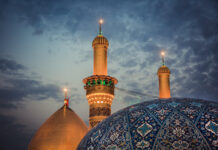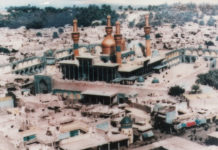Abū al-Fatḥ Muḥammad b. `Alī al-Karājikī (d. 449 AH) lived from the end of the fourth century into the fifth century hijrī, a time of great political divisions. The Abbasid caliphate’s control was limited to Baghdad and the areas surrounding it, while the rest of the Muslim world was split between the Fatimids, the Umayyads, the Buwayhids, and others. This was also a time when the differing schools of thought debated and discussed varying juristic and theological issues. Al-Karājikī was among the foremost scholars of the Imāmī theologians, after his teachers Shaykh al-Mufīd and Sharīf al-Murtaḍā, and would engage in dialogue and debate with scholars from the various sects.
Al-Karājikī wrote this treatise in response to a believer requesting a gloss of the beliefs of the Imāmī Shīʿa, to which he obliged. The following translation is the beginning section regarding theology proper, or Ilāhiyyāt, which summarizes correct doctrine regarding God and His attributes according to the Imāmī Shīʿa. Given al-Karājikī’s historical context, the points mentioned here are in contrast to the views of other theological groups, such as the Muʿtazilah or Ashāʿirah, and should not be understood to be exhaustive.
Treatise Clarifying the Creed of the Faithful
From the book Kanz al-Fawāʾid by Abū al-Fatḥ Muḥammad ibn ʿAlī al-Karājikī (d. 449 AH)
Divine Unicity:
You must know that it is obligatory to believe in the created nature of the entire universe and that nothing existed prior, that God is the creator of the entire cosmos, its material bodies and their attributes, except for the deeds originating from His servants. They perform their own actions, not God[1]. One must believe that God alone is pre-eternal and that there is no other pre-eternal entity. He exists and always was. He shall remain and never cease to be. He is a thing unlike all other things, bearing no resemblance to created things. The attributes of created things cannot be attributed to Him. He knew the creation before it existed and no thing is hidden from His knowledge. God possesses certain qualities that are essential to Him and independent of His creation (literally, without the aid of another). These are His characteristics of being all-Living, all-Knowing, pre-Eternal, and Everlasting. It is impossible for Him to be bereft of these qualities, taking on anything contrary.
It is necessary to understand that He has attributes that are derived from His actions. These types of traits are only attributable to Him after the action. These are the types of characteristics He has described for Himself, such as being the Creator, Sustainer, Giver, Merciful, Sovereign, Speaker, etc. He, also, has characteristics that are metaphorically attributed to Him such as wanting, hating, pleasure, and anger. God desiring (irādah) to do an action is, in fact, the execution of that action. God desiring an action by someone else consists of His command to that action. Labeling God’s irādah as His “desire” is not literal; it is figurative language. In that light, His anger is the threat of punishment and His pleasure is the promise of reward.
The believer must affirm that God does not occupy a physical place. He cannot be perceived by the five senses. The Lord is free of all defects. He does not do any injustice to the people because He knows of its evils and is not compelled to injustice for any reason, even if He is capable of doing so. His word is true and His promise real.
The Lord does not burden creation with the impossible, nor does He forbid them any good that is beneficial to them. He commands us to what He wishes and forbids us from what He wishes not.
He established creation for their own good and commissioned them for the sake of their divine benefit. He eliminated their weaknesses in carrying out their duties and did for creation what is best. He enabled them before giving them responsibilities and graced them with intellect and discernment.
They are given agency, they are able to do or—instead—not do a particular action. The truth that must be recognized is found through reason and revelation. The rational imperative is not separate from the revealed imperative.
God has sent to the people prophets and authorities acting as conduits between Him and them to communicate revealed knowledge. These prophets and authorities alert the people through rational argumentation and convey understanding of matters they cannot know about except through revelation. The knowledge of these decisive authorities encompasses all things that the people need from them. They are protected from errors and mistakes, an infallibility (stemming from) choice. The Lord has graced them above the rest of creation and made them His vicegerents who establish the truth. They have performed miracles by the permission of God as confirmation and evidence for the veracity of their prophecies and claims.
Despite all this, they are created servants of God, human beings burdened with responsibilities. They eat; they drink; they have children. They live and die. They feel pain and become ill. Some of them were killed while others died natural deaths. They do not decree creation or sustenance. They do not know of the unseen (al-ghayb) except for what the Lord of creation has informed them of. Their words are true, and all that they brought is real.
[1] Shaykh Muhammad Rida Muzaffar summarizes this issue as follows: “Our actions are in one respect really our own; we are their natural cause. They are under our control and choice. However, from another perspective, they are decreed by God and under His dominion, for He gives existence and is its source. He does not compel us to our actions, thereby oppressing us in punishing us for evil deeds. This is because we have control and choice in what we do. God did not delegate to us the creating of our actions, thereby removing them from His dominion. Rather, creation, rule, and command belong to Him. He is capable of any possibility and thoroughly acquainted with His servants.” This is to say that for our actions to be the result of our free will is itself ordained by God. This removes the quandary of unjust punishment and attributing evil to God.
(رسالة البيان عن جمل اعتقاد أهل الإيمان)
من كتاب كنز الفوائد لفقيه الأصحاب أبي الفتح محمد بن علي الكراجكي المتوفى 449 هـ
(اعلم) ان الواجب على المكلف ان يعتقد حدوث العالم باسره وانه لم يكن شيئا قبل وجوده ويعتقد ان الله هو محدث جميعه من اجسامه واعراضه إلا افعال العباد الواقعة منهم فانهم محدثوها دونه سبحانه ويعتقد ان الله تعالى قديم وحده لا قديم سواه وانه موجود لم يزل وباق لا يزال وانه شئ لا كالاشياء لا يشبه الموجودات ولا يجوز عليه ما يجوز على المحدثات وان له صفات يستحقها لنفسه لا لمعان غيره وهي كونه حيا عالما قادرا قديما باقيا لا يجوز خروجه عن هذه الصفات الى ضدها يعلم الكائنات قبل كونها ولا يخفى عليه شئ منها.
وان له صفات افعال لا يصح اضافتها إليه في الحقيقة إلا بعد فعله وهي ما وصف به نفسه من انه خالق ورازق ومعط وراحم ومالك ومتكلم ونحو ذلك وان له صفات مجازات وهي ما وصف به نفسه من انه يريد ويكره ويرضى ويغضب فارادته لفعل هي الفعل المراد بعينه وارادته لفعل غيره هي امره بذلك الفعل وليس تسميتها بالارادة حقيقة وانما هو على مجاز اللغة وغضبه هو وجود عقابه ورضاه هو وجود ثوابه.
وانه لا يفتقر الى مكان ولا يدرك بشئ من الحواس وانه منزه من القبائح لا يظلم العباد وان كان قادرا على الظلم لانه عالم بقبحه غني عن فعله قوله صدق ووعده حق لا يكلف خلقه ما لا يستطاع ولا يحرمهم صلاحا لهم فيه الانتفاع ولا يامر بما لا يريد ولا ينهى عما يريد.
وانه خلق الخلق لمصلحتهم وكلفهم لاجل منازل منفعتهم و ازاح في التكليف عللهم وفعل اصلح الاشياء بهم وانه اقدرهم قبل التكليف واوجدهم العقل والتمييز وان القدرة تصلح ان يفعل بها الشئ وضده بدلا منه وان الحق الذي تجب معرفته تدرك بشيئين وهما العقل والسمع وان التكليف العقلي لا ينفك من التكليف السمعي.
وان الله تعالى قد اوجد للناس في كل زمان مسمعا من انبيائه وحججه بينه وبين الخلق ينبههم على طريق الاستدلال في العقليات ويفقههم على ما لا يعلمون الا به من السمعيات وان جميع حجج الله تعالى محيطون علما بجميع ما يفتقر إليهم فيه العباد وانهم معصومون من الخطا والزلل عصمة اختيار وان الله فضلهم على خلقه وجعلهم خلفاء القائمين بحقه وانه اظهر على ايديهم المعجزات تصديقا لهم فيما ادعوه من الانباء والاخبار.
وانهم مع ذلك باجمعهم عباد مخلوقون وبشر مكلفون ياكلون ويشربون ويتناسلون ويحيون باحيائه ويموتون باماتته تجوز عليهم الالام المعترضات فمنهم من قتل ومنهم من مات لا يقدرون على خلق ولا رزق ولا يعلمون الغيب الا ما اعلمهم اله الخلق وان اقوالهم صدق وجميع ما اتوا به حق.




